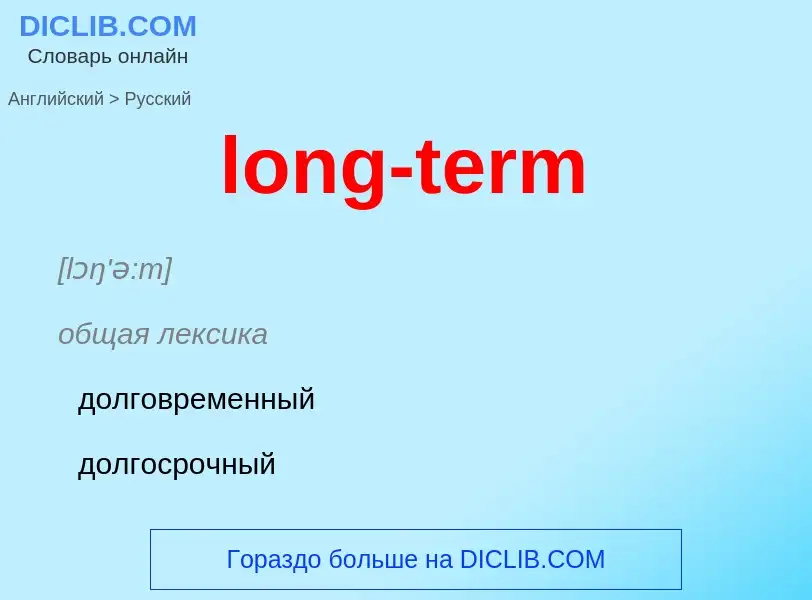Μετάφραση και ανάλυση λέξεων από την τεχνητή νοημοσύνη ChatGPT
Σε αυτήν τη σελίδα μπορείτε να λάβετε μια λεπτομερή ανάλυση μιας λέξης ή μιας φράσης, η οποία δημιουργήθηκε χρησιμοποιώντας το ChatGPT, την καλύτερη τεχνολογία τεχνητής νοημοσύνης μέχρι σήμερα:
- πώς χρησιμοποιείται η λέξη
- συχνότητα χρήσης
- χρησιμοποιείται πιο συχνά στον προφορικό ή γραπτό λόγο
- επιλογές μετάφρασης λέξεων
- παραδείγματα χρήσης (πολλές φράσεις με μετάφραση)
- ετυμολογία
long-term - translation to ρωσικά
[lɔŋ'ə:m]
общая лексика
долговременный
долгосрочный
длительно обеспечиваемый
длительный
перспективный
продолжительный
строительное дело
длительный (напр. по нагрузке)
долговременный (напр. о прочности)
прилагательное
общая лексика
долгосрочный
долговременный
длительный
Ορισμός
Βικιπαίδεια
Long-Term Capital Management L.P. (LTCM) was a highly leveraged hedge fund. In 1998, it received a $3.6 billion bailout from a group of 14 banks, in a deal brokered and put together by the Federal Reserve Bank of New York.
LTCM was founded in 1994 by John Meriwether, the former vice-chairman and head of bond trading at Salomon Brothers. Members of LTCM's board of directors included Myron Scholes and Robert C. Merton, who three years later in 1997 shared the Nobel Prize in Economics for having developed the Black–Scholes model of financial dynamics.
LTCM was initially successful, with annualized returns (after fees) of around 21% in its first year, 43% in its second year and 41% in its third year. However, in 1998 it lost $4.6 billion in less than four months due to a combination of high leverage and exposure to the 1997 Asian financial crisis and 1998 Russian financial crisis. The master hedge fund, Long-Term Capital Portfolio L.P., collapsed soon thereafter, leading to an agreement on September 23, 1998, among 14 financial institutions for a $3.65 billion recapitalization under the supervision of the Federal Reserve. The fund was liquidated and dissolved in early 2000.
LTCM can also be described as using an absolute return strategy in combination with high leverage.

![J.P. Morgan]], [[Lehman Brothers]], [[Merrill Lynch]], [[Morgan Stanley Dean Witter]], and [[Salomon Smith Barney]]—met on the 10th floor conference room of the [[Federal Reserve Bank of New York]] (''pictured'') to rescue LTCM. J.P. Morgan]], [[Lehman Brothers]], [[Merrill Lynch]], [[Morgan Stanley Dean Witter]], and [[Salomon Smith Barney]]—met on the 10th floor conference room of the [[Federal Reserve Bank of New York]] (''pictured'') to rescue LTCM.](https://commons.wikimedia.org/wiki/Special:FilePath/Federal-reserve-33-liberty.jpg?width=200)
![p=xv}}</ref> the [[Dow Jones Industrial Average]] and invested monthly in U.S. Treasuries at constant maturity. p=xv}}</ref> the [[Dow Jones Industrial Average]] and invested monthly in U.S. Treasuries at constant maturity.](https://commons.wikimedia.org/wiki/Special:FilePath/LTCM.png?width=200)


